Don't wanna be here? Send us removal request.
Text
Okay wow idk why I was so hesitant to call this a capitalism film in my post, you point out a lot of shit I did not notice at all that just totally confirm my suspicions. Yubaba controlling Haku with that black slime thing, the sludge monster, no face's wild consumption rampage, the literal physical hierarchal structure of the bathhouse, etc are all things that totally went over my head but make total sense framed this way. Also holy shit, that last paragraph is really good. I can't even comment on it, it's just really well-written and inciteful. Fantastic post!!
Spirited Away

Having been so long since I last saw this movie, I had not only forgotten a good amount of the story, but I also had not appreciated it as much as I do now when I first saw it. I remember much about the fantastical world that this film brings to life, like Haku the dragon, No-Face, the train that treks along the surface of the water, but it’s nice to now understand at least some of the intent behind the creation of this world.
Obviously, capitalism and industrialized society is a big theme in this film. It has become so prevalent that it seems to even have permeated the spiritual realm. There is a nice shot of the bath house when Chihiro first sees it while her parents scarf down food, with a beautiful, bright green tree on the right of the building, and a tall, dark gray smokestack on the left. This shot exemplifies the nature of not only this spiritual world, but the real world as well. Haku, the spirit of the Kohaku river, is being controlled by a black slug to serve Yubaba’s capitalist endeavors. The other river spirit that we see comes in extremely polluted by modern industrial society. Bikes, fishing lines, metal debris, etc. can all be seen coming out of him when Chihiro is helping him. The people in the bathhouse assume him to be some sort of stink spirit and ignore that his existence as this sludge monster is a direct consequence of their own lifestyle. No one would have helped him like Chihiro did, and in fact they try to turn him away at the door, purposefully trying to ignore the problem that they created. This is especially ironic given that it is a bathhouse, a place where people are meant to become clean and refresh themselves, but the bathhouse itself is run by Kamaji, Lin, and the soot sprites, beings all enslaved to the system to work in horrible conditions with little to no hope of escape. This is also a nice commentary on the nature of working conditions in a hyper-industrialized society and how those at the bottom work endlessly in cruel conditions, e.g. having to walk right up to the fire to throw a piece of coal in, so that those at the top, Yubaba, can live in luxury.
Another important aspect of this critique is the transformative nature of the bathhouse, or capitalist society. Because the name of the game is money and wealth at the expensive of nature and of others, those inside the bathhouse are changed for the worst in this pursuit. Most obviously, No-Face, who changes from a silent, distant figure, to an insatiable monster who literally consumes other people, much like the exploitation of others in pursuit of personal wealth in a capitalist society, and also continues to attempt to satiate his hunger with more and more gold. In the end however, he truly wants Sen, and when he cannot buy her with gold, tries to consume her instead. Sen/Chihiro in this film has the power to exorcise this “demon” of capitalism, first healing the river spirit, and then using the ball given to her by the spirit to force No-Face and Haku to throw up the things causing them to feed into the system.
In this film, there is no one “bad guy”. While it is true that Yubaba would be considered thus, there is a reason that she has a twin sister. Chihiro referring to both of them as Granny shows that she knows that they are truly two sides of the same person – Yubaba being the embodiment of capitalist greed, not realizing that her own child has been replaced, and Zeniba as the kindhearted, mother figure that truly cares for her children. In reality, good people can become corrupted by this system and become completely different people, like we see with Yubaba and also No-Face, who at the end of the film reveals his skill with sewing and his timid, kindhearted nature. Even Haku, who Lin is extremely opposed to fundamentally, carried out the “dirty work” of Yubaba as a result of being plagued by Yubaba’s system and in reality, was a kind river spirit that saved Chihiro as a young girl. No one character is bad, and every character has a complex relationship with life, existing in between the worlds of the industrial and the natural.
3 notes
·
View notes
Text
on Spirited Away - Hayao Miyazaki (2001)
Initial Impressions
We've finally made it! The last film I'll be reviewing for this blog. And quite the classic at that. I'm gonna be honest though, I've never really liked this film very much, and I'm not entirely sure why. The first two or three times I watched it I fell asleep halfway through, I think because the film is honestly kind of boring? Surely I can't be the only one that thinks that? Regardless, despite nearly falling asleep this time too, I found a lot more to appreciate this time around and can actually say I see the appeal now. Still prefer Ponyo tho lol
Further Critique
At first, I couldn't really find anything to read into in this film. It's a relatively straight-forward Alice in Wonderland type tale loaded with Japanese folklore references and silly creatures doing silly things to make the kiddies laugh. But it kinda hit me when Yubaba took Chihiro's name, widdling it down to one character, an action which effectively makes her a slave to the bathhouse with the only means of escape being to remember her name... I think... I think this film is about capitalism?? (well specifically western consumerist culture and its influence on Japan but yeah). Forgive me for putting the marx cap on again, but hear me out... ever wonder why the parents in the beginning turn into pigs specifically?? WELL did you notice how the parents come in with their imported Audi, European clothes, and credit cards, commenting on the abandoned theme park being a relic of the bubble economy, a time of rampant consumerism that ended in ruin? Here I believe Miyazaki is trying to say that these modern examples of gaudy western consumerism (the parents) are no different from those of the bubble period (the pigs). Also, it's interesting how in an otherwise minimalist, traditional Japanese-styled bathhouse, Yubaba specifically wears European dress and lives in a European styled room full of random things on the top floor, as if to symbolize western consumerism's cultural dominance over Japan post-Meiji. Also yeah, that thing about one's name being linked with one's autonomy is (I believe) a clear metaphor for how employers strip away the individuality and autonomy of their employees, leaving only what serves their interests (the worker's value as a source of capital generation, symbolized by the remaining character, 千). It's only through remembering one's identity as an autonomous individual that one recognizes that they've been fashioned into another cog in the machine. I could be reaching for straws here, but I don't really think I am considering that Miyazaki has openly stated his gripes with western consumerist influences, and is also known to be very intentional with each element in his films.
Needless to say, I definitely got a lot more out of this viewing than I did the previous three lol. I still feel like its reputation as like THE ghibli film is a bit of an exaggeration, as it's hardly even in the top five for me, but it's certainly not as shit as I thought. 7/10
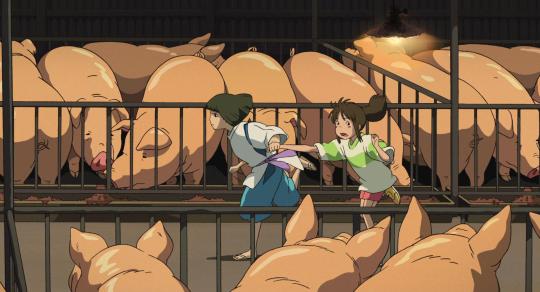
Thanks for the great semester ya'll!! Many great films (and many ASS films) were had. Hope ya'll have a great summer filled with many opportunities to watch MORE FILMS!!!
0 notes
Text
Hey, fantastic post! I totally agree with you about the cinematography and set design! Also I totally forgot about the "anime otaku? line, that shit was funny as hell.
Sukiyaki Western Django

Sukiyaki Western Django is an absolutely insane film by Takashi Miike. So many moments in the film left me genuinely in awe of what I was witnessing. The film acts effectively as a parody of the western genre, using many western tropes in very extreme ways. The most shocking aspect of the film to me was the inclusion of Quentin Tarantino as an actor. In addition, there were also moments where I entirely lost track of what was going on in the chaos, such as when the white clan attempts to kill the main character while he’s sleeping in a bed by shooting through the roof.
The film follows an unnamed lone wanderer as he travels to a ghost town. Upon arriving, he involves himself with a conflict between 2 groups attempting to obtain treasure that is apparently hidden somewhere in the town. The 2 groups are the white clan and the red clan. Rather than joining one of the two groups, the lone wanderer ends up deciding to side with the remaining villagers of the town and fights to wipe out both clans. In the end, almost everyone has been killed and all that remains is the lone wanderer, a boy named heihachi and heihachi’s grandmother.
The film is not afraid to flaunt its parody status, including many anachronistic elements for the shock value alone. Examples of this can be seen in the minigun, Quentin Tarantino’s electric wheelchair, and Quentin Tarantino talking about how he is an ‘anime otaku’. Some of the western tropes the film plays with are the lone wanderer, the corrupt sheriff, the saloon brawl, the standoff, etc.
A few things I found particularly interesting about the film were its cinematography and sets. Many of the sets looked great and really fit the scenes they were used in. The exception to this is the flashbacks between Quentin Tarantino’s character and Bloody Benten, which was likely a deliberate (albeit visually jarring) choice. Although I do believe we’ve seen much better in the class so far, the cinematography often did a good job of framing the action and felt dynamic.
Oh yeah, and for some reason the entire movie is in English. Through choosing to write basically the entire script in English, it made the film feel like a parody of films from the west in general to me rather than specifically the western genre.
After doing some research, I heard that apparently this film performed very poorly at the box office and lost over a million dollars. That’s a shame, because I did really enjoy watching it. Despite this financial failure, Miike seems to make plenty of films so he’s presumably fine.
2 notes
·
View notes
Text
on Sukiyaki Western Django - Takashi Miike (2007)
Initial Impressions
I was not expecting much going into this, thank christ lol. This was certainly an experience. There's certainly a lot to appreciate about this steaming dumpster of a film, from the creative blend of genres, styles, and cultural signifiers, to the insanely tight-paced and well-edited action. Unfortunately though, I'm not the biggest fan of films that purely serve as a source of entertainment without anything of substance to offer, so despite there being a lot to enjoy here, it didn't leave a significant impression for me.
Further Critique
The main source of enjoyment for me throughout this film was just the raw creativity on display. The use of the Heike Monogatari and the references to Django and Yojimbo among other things gave the film a very unique feel, particularly enjoyable for those who get the references (I'm a big Heike fan lol). On the same note, there were several creative uses of symbolism, like the bells, roses, and of course the colors of red and white. Of course, the shot direction and fight choreography were also extremely impressive and fun. Set design and cinematagraphy were also stellar. The production in general for this film was solid. But by far my favorite thing about this film is the dialogue. There were so many lines that had me pointing and laughing hysterically while Karin just sat there completely unamused, very good. Some of my favorites were: "SHIT OR GET OFF THE POT", "This is sukiyaki, not a damn lolipop", and "Keep it in your pants, lily-liver. The tougher man gets the girl", etc. Very good.
As far as actual critique I've got basically nothing aside from the obvious prevalence of tropes. You've got the typical "WOAH THAT CHARACTER IS THAT CHARACTER'S SON WHO'S THAT CHARACTER'S DAD!!????", the "Man with No Name" thing, the badass bitch, etc. Not much to say about that but yeah. Oh also, fucking loovvved Quentin Tarantino's performance in this. You always need at least one random white guy to spice things up a little. One critique I had was the pacing and setup at the beginning were a bit off and it took me a while to figure out what was going on.
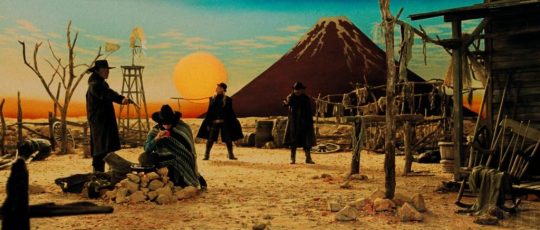
Overall, pretty well packaged and presented garbage with a lot of cool little tidbits and silly moments. Really unfortunate how much of a fucking box office failure this film was lol. It definitely wasn't that bad... 5/10
1 note
·
View note
Text
Wow I totally forgot but yeah the sound in this film was in fact really cool. Also yeah I think you hit the nail on the head with the whole nature thing. Great analysis!
Sweet Bean
I clap my hands. Wonderful, amazing! It's so funny to watch this after Pulse's tirade (the word lovingly used by me) about the epidemic of loneliness.
The found family aspect was wonderful to see emerge between Tokue as the mother, Sentaro as the son, and Wakana as t
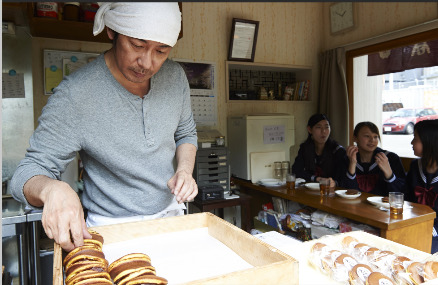
he granddaughter. It is such a gradual realization confirmed finally in Tokue's last message to the two of them that was so sweet to hear. I think what creates this strong feeling of becoming family are the scenes of Tokue and Sentaro working together to create dorayaki especially when compared with each of them struggling to create dorayaki on their own and also the conversations Wakana has with each of them. To begin with, Sentaro giving Wakana the rejects is already a sweet gesture that implies they have a strong relationship. Furthermore, Wakana somewhat sharing a meal with Sentaro (especially when it's clear her mother has abandoned her to go find dinner on her own) and giving him advice about Tokue's employment feels a little like a consultation between family members. Of course Tokue giving Wakana advice about how to live her life freely and offering to take care of the canary was very sweet and grandmotherly.
On another note, the use of sound was kind of interesting? I mostly noticed it whenever Sentaro was walking up and down stairs. The heavy thuds of his depressed steps when we are first introduced to him as well as a similar after the dorayaki shop starts to crumble are so loud that it's unreal and emphasizes the sense that something is going wrong for him. Otherwise, the contrast between Sentaro carefully crafting his pancakes while the middle school girls noisily chatter in the background was seriously hilarious. The film is able to use sound in ways that set the emotional tone of scenes in interesting ways.
To end, the relationship between Tokue and nature is interesting especially when considering that quote from the book about leprosy. Those with leprosy/Hansen's Disease want to live in society "where the sun shines" too. Tokue listens carefully to nature and this way she is alone and lonely but surrounded by beautiful and noisy nature. The film shows us and lets us hear the sounds of the nature that Tokue loves so much throughout the film as well. It feels like nature is also society, that both are one and the same, and by enjoying nature we can also become part of society as well. The ending scene of all the people cherry blossom viewing and Sentaro setting up his own stall, calling out to them, might be representative of this as well. Everyone loves nature! We're all looking at the same moon!
4 notes
·
View notes
Text
Hey Karin, as always you understood this film a lot better than I did lol. I for some reason hadn't thought about how the sealing of the red tape rooms was a way to provide a space for the spirits to dwell in, and that the reason lonely people are drawn to them is because they can somehow sense their presence. Also, I totally forgot but yeah, it would make more sense that the victims aren't actually dying and are instead entering some kind of purgatory or permanent loneliness or smth
Pulse by Kiyoshi Kurosawa
The film「回路」which was localized as Pulse for the English release, directed by Kiyoshi Kurosawa in 2001, is a gloomy and unsettling horror movie that explores themes of loneliness and human connections.
By surrounding doors with red tape, one can create a "forbidden room”. This serves as a conduit for ghosts who have nowhere else to go in the afterlife, functioning as a “回路 (circuit)" through which they come into this world. They entice lonely individuals, drawing them into solitude and coming into our world. Initially, it might have been just a whim of the construction site worker, but gradually it gained momentum and spread. As the dots on a computer screen illustrate, humans are not interconnected individually; rather, they're fragmented. Despite our tendency to yearn for closeness when we drift apart from others, we're fragile beings who perish when too close. Observing such lonely individuals, "they" watch for the unguarded moment and impart the method of creating the "forbidden room". This 回路/circuit grows rapidly, ultimately causing the disappearance of townspeople and plunging the world into chaos.
The protagonist, Michi, differs from others by actively engaging with people and attempting to solve problems. She checks on Taguchi, who stops coming to work, shows concern for Yabe, takes care of Junko, who became disturbed after seeing a ghost, searches for the missing president, visits her parents, and suggests and assists Ryosuke in finding Harue. It is because of her proactive nature that she remains unaffected by the influence of “them" until the end. However, there is concern for her future, especially considering her statement “I was happy with my last friend."
The film incorporates elements that prompt reflection on life and death. Harue feels despair within her loneliness and becomes intrigued by the afterlife. As the circuit expands and people with whom she has a connection at least disappear, her despair reaches its peak. Sensing the presence of ghosts watching over her, she finds solace in not being alone and chooses death (i.e., opting for the world where they exist). In contrast, Ryosuke longs for the realization of an immortality drug, wishing to live forever. Despite actively engaging with people by showing concern for Harue and talking to Michi, there are no scenes depicting him with anyone else like friends or family. Therefore, he likely seeks connection with others, evident from his foray into the internet despite his lack of understanding of its workings. Both characters, despite their different directions, remain solitary and avoid confronting death. So, are people inevitably lonely whether they are alive or dead? If we borrow the words of the deceased, who speak of death as eternal loneliness, it seems that death is just a line, and life after death is a continuation of the current state. Therefore, instead of despairing over loneliness or death, it is crucial to cherish connections with others as much as possible.
Given the premise that the ghostly realm overflows into our world in the film, it's possible that those who have turned into black marks or have committed suicide might not even be capable of dying. The woman who jumped to her death and Harue showed no signs of blood. It seems more plausible that fearing the "eternal loneliness after death”, they simply vanished into solitude. Also, the reason the “口" in the "回" character of the opening credits of “回路/Pulse" was red might symbolize the doors sealed with red tape. In other words, it likely represents the circuit connecting this world and the afterlife, existing within our world.
The use of high-angle shots from a diagonally tilted angle, reminiscent of the perspective of ghosts, news segments framing missing persons with black borders (reminiscent of remains photo frame), sudden cessation of sound, and voices pleading for help over the phone contributed to the eerie atmosphere of this film. To be honest, these techniques were more unsettling than direct appearances of ghosts. Additionally, memorable scenes involving mirrors and reflections, such as the covered mirror in Harue's room or the projection of one's own back in the monitor, the library’s maze-like structure, and the convenience store clerk visible from the interior through a two-way mirror in the backyard, added to the sense of unease, because mirrors are often used to symbolize the connection between the afterlife and the mortal world, such as in the case of parallel mirrors.
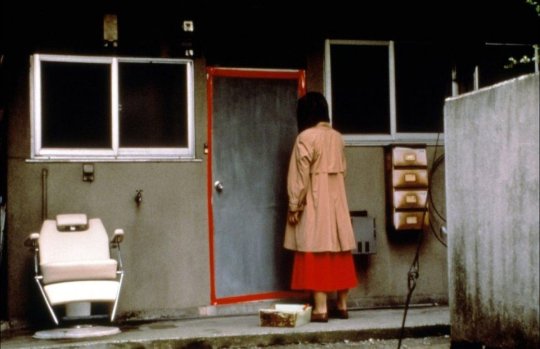
2 notes
·
View notes
Text
on Sweet Bean - Naomi Kawase (2015)
Initial Impressions
This was also a pretty mixed experience. The contents on their own are quite wholesome and laid-back, the narrative is easy to follow, and it's consistently well presented. That being said, it was kind of boring and predictable as fuck. The only thing I didn't quite see coming was the Leprocy thing, despite it clearly being hinted at from the beginning, but that was the one thing I actually really appreciated about the film, as I can't really think of another piece of media that centers around leprocy off the top of my head, so it's nice to see some rare representation.
Further Critique
I genuinely can't think of much to say about this one. Theme-wise it's pretty straightforward. Tokue frequently talks about freedom, the freedom of youth, the freedom to fly like a bird, the freedom to be out in the sun, (not so) subtly hinting at the heavily restricted life she's been forced to live locked up in a facility since she was a child due to her illness. She also talks a lot about the importance of appreciating the rich sensory experiences available all around us, namely those found in nature, and frequently comments on the beauty of the cherry blossom trees near the shop (potential impermanence undertones???). Oddly, there's not nearly as much of an emphasis on food as one might expect given the subject material, but I would imagine Tokue's deep appreciation for An ties back to the whole appreciation of sensory experiences thing.
There were certainly a lot of things I found a bit odd about this film. Obviously, there's the aforementioned dragged-out feeling present throughout, particularly because of just how much time is spent in that cramped kitchen, leaving much to be desired in terms of visual variety. Additionally, Sentaro's character personally felt extremely odd and underutilized. He was shown experiencing intense turmoil at multiple points throughout the film, but to me it felt like those scenes weren't at all sufficiently built up to. I had almost no reason to sympathize with him until way towards the end of the film when the owner brings in his young future replacement and talks of plans to remodel the shop. His backstory too felt extremely underutilized and poorly explained, and I wish we would have gotten a little more exploration of his character, as that would have certainly gone a long way toward making this film less bland. Now that I think about it, that was probably my main issue with the film. It just doesn't really do anything with its characters. Lots of things happen, but nobody really grows and changes much, nor do they like deal with the shit in their past or anything like that, they are kinda just mostly static throughout. Of course, by the end of the film, Sentaro is seen working at his own stall, but it's unclear how that happened or why, so I didn't really see the point in showing that? Idk maybe I missed something, but for me at least the film felt generally lacking in a lot of areas. Overall, a moderately wholesome and enjoyable experience with some much needed representation and a basic, albiet cute message. 6/10
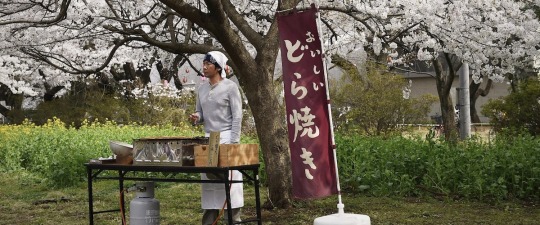
1 note
·
View note
Text
on Pulse - Kiyoshi Kurosawa (2001)
Initial Impressions
I had a pretty mixed experience with this one, mostly because I went into it with somewhat confused expectations. First of all, this being branded to me as simple "J-horror" was detrimentally redundant, as the film felt more to me like a unique blend of various genres (ranging from techno-horror to psychological thriller to apocalyptic sci-fi), which is apparently the type of film Kurosawa is known for. In terms of horror, much like Ring, this film scarcely had any genuinely scary bits, although the techniques used here were regardless remarkably more innovative and effective than whatever the hell that film was doing. Unfortunately, this film— at least to me— also felt extremely scattered and inconsistent, despite containing many memorable and interesting scenes/ shots.
Further Critique
In terms of presentation, the film overall carries that uniquely pleasant early 2000s essence that I am notoriously in love with through its set design, costumes, effects, and camera work, which was personally the main draw for me. There were also several noticeable camera techniques and shot compositions that caught my attention. For example, the camera would occasionally switch to handheld. I first noticed this in the scene when Yabe comes back drained after his ghost sighting. I'm not entirely sure what the significance of that was but it was certainly a striking choice. I was also pretty satisfied with the film's depictions of its ghosts, although a little confused with how inconsistent they were. I also really liked the consistent parallel framing across scenes when the characters would fade into a wall, always being against the left side of said wall, often next to a window. This pattern made it easier to anticipate the deaths in the latter half of the film. Another thing I REALLY liked and wish would be better utilized in horror generally was this film's use of liminal space and silence. The way the film slowly drip-fed more and more scenes depicting characters alone in big open spaces where one would normally expect to see an abundance of extras was extremely effective in my opinion, especially because this is the main device through which the subtle apocalypse happening just outside the main plotlines is communicated to the viewer. Additionally, there were a number of scenes that effectively utilized silence to elicit an errieness that I don't think could be accomplished through the use of your typical spooky noises. What comes to mind are of course the scenes where nothing can be heard but the faint whisper of a ghost/ vanished individual calling out for help. Those were the only scenes that actually kinda got to me. In general, these are two elements I want to see more often utilized in horror, as I'm really tired of the typical jumpscare shit and want to see something that really plays with that existential dread of being alone in an open, quiet space.
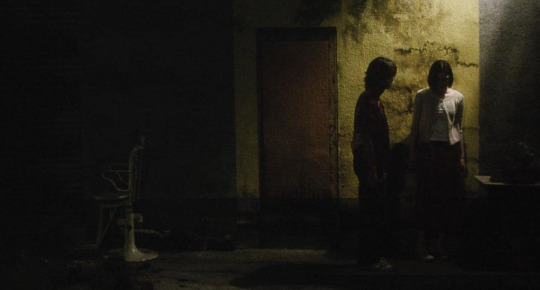
In terms of themes, this could not be more on the nose. In fact, one of my main gripes with this film was just how overstated its themes were, introducing the metaphorical dot simulation one scene and then explicitly explaining the metaphor through dialog in the next. There was also a bit where one of the characters just randomly starts lecturing on the Hedgehog's dilemma unprompted, like they really couldn't have spelled it out more clearly, and I felt that kinda detracted from the otherwise mysterious, show-don't-tell type of story that the film seemed to be going for. That being said, I don't entirely know what the actual conclusion was meant to be, aside from just a vague critique of the internet's effect as an alienator and a commentary on the Hedgehog's dilemma, but I did find some of the methods the film used to communicate its themes quite deep and worth further exploration, namely the significance of the red taped rooms and their apparent connection to the dot simulation. According to a video essay I was casually listening to while cooking lunch, all of the main characters who die from ghost encounters are first drawn into the red taped rooms for whatever reason (loneliness or smth idk), at which point someone close to them starts searching for them, only for their fate to be sealed the moment they come in contact again. I'm sure you can see the obvious parallel here to the dot thing, although I'm not entirely sure what the point of any of that is? If ya'll have any theories feel free to drop 'em down below. Overall, a very interesting film with some slight annoyances here and there, solid 6/10.
0 notes
Text
Hey Alex, it looks like we share pretty much the same take on this one, the framing, sounds, and music were all pretty well utilized, but they weren't really enough to make the film succeed as horror. I also thought the lore was interesting and could be potentially better explored in the later films, so I might consider checking some of those out in the future. Great post!
Ring
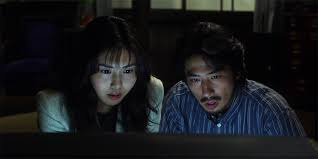
Reviews of Ring tout it as horrifying, disturbing, and are generally very positive. However, I didn’t find this movie really all that scary at all. I judge whether a movie is scary based on if I get anxious thinking about it after viewing, and I just didn’t. During the movie, I only got startled by the sound design really, as the few jump scares were accompanied by loud sounds. I think I went into this film with inflated expectations from general opinion, so my enjoyment wasn’t that high.
One thing I did like about this film was the framing, specifically the use of narrow areas. In the opening scene, the girls hear the phone ring and go to check it out. A shot shows one of them walking down a hallway, and we, like the girl, are unable to see around the corner. Limiting us to the view of the characters did a great job of adding to the suspense that anything could be just out of view, ready to reveal itself. It also leads to a claustrophobic effect, most apparent in the well scene. That scene made me really uncomfortable, from the narrow space to the murky water, especially knowing that Sadako’s decomposing body was in there with them. I did also like the soundtrack. It did well subtly shifting the tone of scenes, and was only really apparent if you focused on it specifically.
As for the plot, there is a video tape with rumors that if you watch it, you will die in one week. Reiko investigates this and ends up watching the tape. Following some paranormal occurrences, she recruits the help of her ex-husband Ryuji, who she also shows the tape. I enjoyed the urgency that came from the one week deadline, with each delay or passing day adding significant worry to the characters, Reiko especially (Ryuji didn’t seem to have much concern for himself sometimes). The two eventually find out that Sadako, a girl born with paranormal abilities decades ago, and then killed by her own father, was behind this.
Thinking about it again, the lore, and the way it was introduced such as visions, were both interesting. Maybe because I just wasn’t in the right mood for the viewing, or maybe because I didn’t find it scary, did I think the movie was just alright. The ending explanation that you have to show the tape to another person to live created an interesting premise in that the story will continue cyclically, but it just wasn’t that impactful. Overall, I do see why this movie spawned a number of remakes and is enjoyed by a large fanbase, but it wasn’t for me in the end.
2 notes
·
View notes
Text
on Ring - Hideo Nakata (1998)
Initial Impressions
I was initially expecting this to properly spook me, so I was kinda dreading seeing it, but not gonna lie, it was kinda boring as fuck. The music and sounds were pretty good but everything else felt bland, mediocre, and dated. There also wasn't really anything scary about it?? It felt much more like a mystery than a horror film, and with that, it felt really long and uneventful and without much suspense or intrigue. Like in terms of production, it was pretty standard and without any noticeable flaws, but as a film it kinda failed to do anything in particular and it ended just as vague and unclear as it started, hinting at a continuation without giving any real resolutions, completing any character arcs, or really anything you would expect from a finished film, particularly one with this high of a reputation.
Further Critique
I kinda summed up most of my thoughts about this with just that brief paragraph, but I suppose I can get a little more specific with some of my other issues with the film. One of the first things I noticed was just how flat and fake the acting of any non-main character was. This immediately made it difficult to get invested and locked me into viewing this purely as a dated, low budget, half-assed horror film from the get go. Adding to this, any attempt the film made at visual horror was just bafflingly bad. The low-effort warped images, the color inversions and shifts to b&w, and every other visual effect used just did not make any sense to me as attempts to illicit a fear response. Even the presentation of the main boogieman, Sadako, was a complete failure at this as well imo. For one thing, they failed the don't show the monster rule pretty fucking hard, despite her not even really being present for the majority of the movie. The moment that immediately comes to mind is when she comes out of the TV and then just slowly moves toward Ryuji in full view. This bit lasted so long, and her movements were clearly visible and not intimidating in the slightest, so Ryuji's reaction wound up feeling ridiculous and over dramatized. The only moment in this entire film that even remotely got to me was the scene where Reiko wakes up and finds her son watching the tape, but because I had kinda already logged out of the film for all the reasons stated above, that's not really saying much.
For the sake of not sounding entirely negative, I suppose I should mention a few things in the film I thought were kinda cool as well. Like I mentioned before, the music and sound effects are pretty well made and well utilized. I also thought the actual contents of the tape itself were pretty creative and interesting, and the scene at the bottom of the well with Reiko hugging the skeleton was also pretty neat, although it's still kind of unclear to me what exactly happened there or why that scene was included at all if it wasn't actually going to have any effect on the curse. Overall, not really much to enjoy here other than some cool sounds and silly visual effects. 2/10

0 notes
Text
Hey, great short but sweet post! I totally agree that the film felt a bit like a series. I don't 100% agree with your interpretation of the film though, as I feel like it's a bit too much of a negative reading to call it a "critique" of the pursuit of ambitions, but it certainly does highlight the costs of doing so and the importance of appreciating what one already has. Your likening of the butterfly to Icarus is super on point, I wish I thought of that. Great analysis!
Iwai - Swallowtail Butterfly
This movie was a ride from beginning to end. I don't know if it was just my viewing experience, but I almost thought I was watching a series instead of a movie. This seemed to be another movie where vignettes or parts of a hole form to create an overall meaning to the film.
Figuring out an overall theme or message was a bit hard to figure out with the length and variety this film had to offer. But, if I had to say, I think Swallowtail Butterfly is a critique on ambitions power to corrupt people and tear communities apart. I think the obvious symbolism of this movie is not movie or yen itself, but how yen stands in for ambition. None of the characters truly seek to make the most yen they can, but to realize the wishes they so sought before but were not able to. The film then, presents us with an assemble cast of bizarre characters who seek to make yen, and in the process, forget about the community from which they came from. Once they realize that such a life is not truly worth it and that the yen has corrupted them, they return to the community. This can be likened to the squashed butterfly that Ageha saw in her childhood, a butterfly that, like Icarus of greek myth, tried to fly too high or sought an ambition to lofty, and forgot about the dangers it came with.
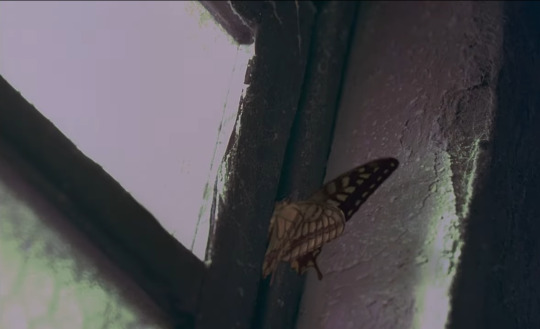
5 notes
·
View notes
Text
on Swallowtail Butterfly - Shunji Iwai (1996)
Initial Thoughts
This movie was a wild ride from start to finish. Not gonna lie, it was definitely pretty hard for me to follow, particularly because of the film's "free-flowing" structure and the abundance of characters and settings. The overall style was immensely captivating, I felt totally entranced throughout the viewing by the creative handheld camerawork, impressive set and costume designs, and the unique worldbuilding. There's also obviously an emphasis on multiculturalism, creative expression, and relentless aspiration, which are all very cool and good things in my book, so vibe-wise I was totally on board with this one, but nonetheless my dumb baby brain kinda struggled to fit the pieces together and consistently follow the narrative, so my enjoyment of the film was a bit muddied as a result.
Further Critique
The main thing I appreciated about this film was its multifaceted portrayal of poor immigrants. On one hand, their actions could be viewed as greedy and opportunistic, concocting schemes to rob innocent businessmen, but on the other, they could be seen simple attempts at managing to get by with what they can get their hands on in what appears to be an unstable global economy. Their DIY scrapyard village was also quite the sight to behold, it seemed like quite the nice community hub despite its dirty appearance and desolate surroundings. Speaking of which, the set design and overall visual presentation of this film was crazy unique and impressive. A scene that particularly comes to mind is the one in Archer's appartment (?). The room had this dark, dingy vibe with static on the TV and lights flashing through the windows, creating this oddly tense yet comfortable feeling space, which coupled with the rain pouring down the windows and the shaky camera almost felt like being on a boat in the middle of a storm. Just about every other shot in the film had a similarly unique and evidently meticulously crafted composition to it that just made the whole experience endlessly visually appealing, helping to counteract its relatively long runtime.
The most interesting thematic element in the film is of course the symbolism of the swallowtail butterfly, which is generally said to represent endurance, hope, and change. I'm not entirely sure how to read the use of the butterfly as a symbol in the film, as there are several potential interpretations, but to me it felt like it hinted in some way to the fleeting nature of life. You could say that the caterpillar on Ageha's chest becoming a butterfly by the end of the film reflects her newfound acceptance of her Yentown-tied identity and her subsequent growth as a result of that change, but I think there are a couple other instances of the butterfly being used in the film that take its meaning a step further. Fei Hong recalling the flying Yentown band ad just before his death, as well as the flashback scene where baby Ageha accidentally squashes the butterfly in the window, could be read as symbolizing how no matter how graciously one flies, or to what heights one reaches, the fragility of one's successes in life is comparable to that of a butterfly at the mercy of the wind.
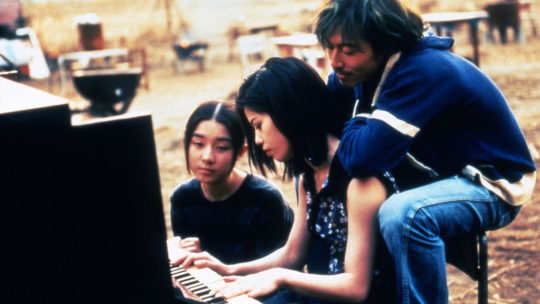
Overall, an extremely unique and interesting film with a lot more to dig into. I'm a bit disappointed I couldn't find any video essays discussing this as I feel like it's quite ripe with things to talk about. Solid 7/10
0 notes
Text
Hey Karin, fantastic analysis. It's clear that there were certainly a number of thematic elements that totally went over my head as usual. I found the symbolism with the sea in particular really interesting, I can't believe I didn't catch that. Also the thing with flowers and fire, knowing that certainly would've made the film a lot more interesting.
Hana-bi by Takeshi Kitano
The film "Hana-bi” was directed by Takeshi Kitano in 1998. The title of the film is not only a play on the fleeting beauty of fireworks but also a reflection of life and death. “Hana (花/flowers)" symbolizes life, while “bi (火/fire)" represents death (gunfire). As indicated by the title, the film contrasts the paths of Nishi, who descends into a path of destruction through repeated “gunfire" for his wife, and Horibe, who rediscovers hope for life through "flowers" and paintings.
Both former detectives are cut off from their path after an incident. Nishi, who has lost his child, job, and money, and faces his wife's imminent death, resorts to robbery and multiple killings to spend his final moments with his wife. On the other hand, Horibe is devastated after losing his wife and children who got along well, and suffering from a disability. Neither life is filled with happiness. However, the contrast between Horibe, who ultimately chooses to live thanks to Nishi's gift, and Nishi's decision to choose death alongside his wife, is heartbreaking.
Another contrast depicted in the film is Nishi's merciless violence juxtaposed with his gentle affection towards his wife and comrades. He embodies both a violent side, seen in his merciless killings of comrades' assailants and Yakuza, and a gentle affection, evident in his gestures of giving gifts to Horibe and his deceased comrade' wife, playing card games with his wife, and even sharing his cake with her. These seemingly contradictory traits encapsulate Nishi's character, beautifully woven together in the screenplay to depict both violence and love.
Also, the scenes featuring Nishi, who is taciturn and not very expressive, and his wife, who remains completely silent, possibly due to the trauma of losing their child, are tranquil compared to the tumultuousness of his days as a detective and the gunfire exchanges with the Yakuza. Even without words or sound, their emotions and affection are conveyed to the audiences through their acting, thus emphasizing the film's ephemeral beauty and grace. The words spoken by the wife to Nishi at the end, "Thank you, and I'm sorry," resonated deeply, conveying gratitude and apology for making him get his hand dirty, the trip plans he made, the death of their child, her resignation to life, and their end. I feel that she understands everything, and it emphasizes the deep affection between them and their profound connection. Though the peaceful and warm moments they shared made the final choice sorrowful, it was also a moment of beauty, evoking a sense of love.
The beauty of the sea was also striking in this film, but it seemed to be portrayed as a symbol of death. Because Horibe is disillusioned with his circumstances and future life and gives up on living, he frequents the sea. The scene where he approaches the sea in his wheelchair, his feet gradually getting wet, evokes thoughts of impending death, and he ultimately attempts suicide. However, after he is drawn to flowers and finds hope in painting, he no longer visits the sea. In contrast, Nishi and his wife, after spending peaceful moments together, end their lives by the sea. The sea, beautiful yet possessing an inexplicable fear from its depth, seems to juxtapose the beauty and terror of life and death.
Moreover, the artwork featured in the film is remarkable. Joe Hisaishi's music evokes memories of Studio Ghibli films, adding to the poignant and beautiful atmosphere of the movie, while Takeshi Kitano's paintings, scattered throughout the scenes, are unique and impressive. There are not only those depicted by Horibe in the film but also displayed throughout various locations such as the opening scenes, cafes, hospitals, inns, and Yakuza offices. Particularly noteworthy are the paintings featuring animals with flowers or those crafted using kanji leaving a lasting impression.
In terms of direction, I like that Nishi's bank robbery was depicted entirely through grainy surveillance footage, with no sound. That is innovative and striking. In this scene, Nishi mimics shooting a man with his gun, showcasing his sense of humor. Many scenes evoke a chuckle, and it is one of the captivating aspects of this film. Additionally, there are many instances where direction seamlessly merges two different scenes or elements, such as lighting a cigarette and gunfire, and music halting in sync with the character's movements.
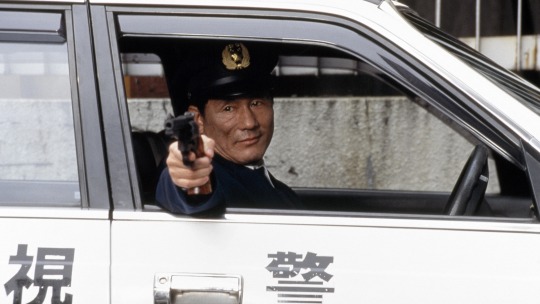
3 notes
·
View notes
Text
on Hana-bi - Takeshi Kitano (1997)
Initial Impressions
My first impressions when watching this film were of course regarding its soundtrack. I had known ahead of time that it was done by Joe Hisaishi, and his unique style was immediately noticeable from the first scene. That vibe did personally feel slightly out of place for a movie like this, but the music was kinda just really good so I didn't really mind that too much lol. I also thought the violence was a bit silly and the plot in general was kinda dumb, but it was still an enjoyable viewing experience overall regardless. Also, the sound effect mixing was kinda weird, but idk how much of that was because of my single earpod listening experience lol.
Further Critique
This was definitely one of those films I had a pretty hard time following and thus got like nothing out of it. It was clear pretty early on that some kind of incident happened prior to the events of the story which Nishi and the other characters have to process and deal with the consequences of, but despite this event eventually being sort of explained, it didn't really carry the kind of emotional weight/ significance you would expect (at least for me personally). I had a really hard time sympathizing with Nishi, partially because I was given basically no reason to aside from his wife's illness, and partially because half of this movie is just him doing crimes and brutally killing people all to help the people who's misfortunate situations he feels responsible for (I'm honestly still not entirely sure why?? Like, yeah he was there when his partners were killed, but it didn't really seem like his fault???). Like, I'm all for the whole atonement plot type of thing, but at least give me enough of a reason to care about the guy's motives before he just starts beating the shit out of people.
If I had to come up with one thing I enjoyed about this film, it was probably the dynamic between Nishi and his wife, especially seeing them just fooling around on that road trip. There's just something about Nishi's stoic but happy face next to his wife just constantly mesmerized by the simplest of things. I also liked how these scenes were intercut with cuts of Horibe's art, although I'm not entirely sure what the intentions were behind that. I also thought the directing and cinematography was pretty solid all around, although maybe a few too many of whatever you call those cuts that go from one action to another similar action accompanied by big noise. Those honestly kinda started to get annoying at a certain point lol.
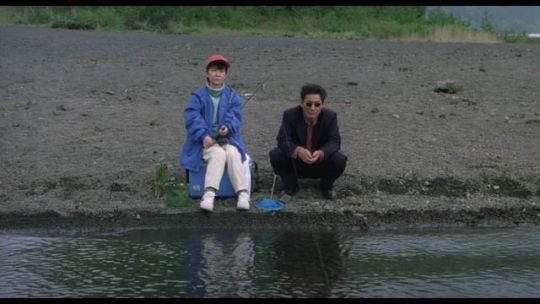
Overall, I'm not entirely sure where the praise for this film comes from, but the music was fantastic👍 5/10
2 notes
·
View notes
Text
Hey Keegan, excellent post. I think you put it quite brilliantly at the end there with the whole "forced to embrace a single identity" thing. Now that you explain it, it totally makes sense why there was such a strong conflict between Sugihara and his father, I was honestly a little lost on that when we were watching it. Great analysis!
GO
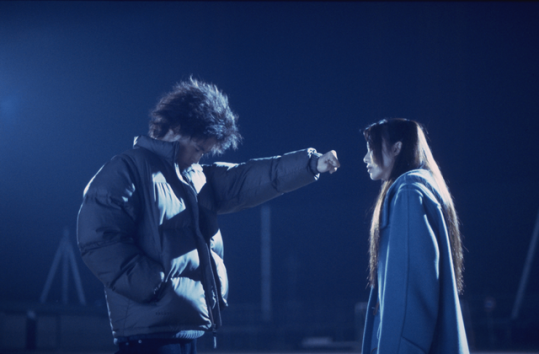
Yukisada Isao’s GO is a very well-done coming of age story that deals with the issue of ethnicity and nationality in Japan at the time. For a 2000’s coming of age story, something that someone my age is more than familiar with, this was a very refreshing take, primarily because of the social critique embedded in the story. Sugihara’s character is similar to that of the main character of The Catcher in the Rye, the book he is reading at the party where he meets Sakurai. Not only a social outcast at his new Japanese school, he is foremost a societal outcast, being a North Korean born and raised in Japan. He doesn’t feel he belongs to either culture or ethnicity, getting into fights with his teachers at Korean schools and deliberately speaking Japanese to them, which is forbidden at the school. I love what Sugihara’s one friend from Korean school says about the Korean equivalents of the Japanese phrases he gets in trouble for saying: “it doesn’t sound right”. Being raised bilingually, especially in this instance biculturally as well, creates a very unique identity for these kids. They learn and can speak Korean, but still feel the need to express themselves in Japanese, the language spoken around them in their environment outside of school. Even the notion of language in this movie shows how in-between these kids are.
In addition to Sugihara’s refusal to fully accept being Korean, he also cannot be fully accepted as Japanese due to the societal rules. He and his friends are treated poorly by police, must carry foreigner identification, and we even see the attitude of otherness and dirtiness of anything other than Japanese in the ideas carried by Sakurai from her father when Sugihara first tells her that he is Korean. In that moment, it is no big deal to him, we also see him begin to outwardly express his embracing of his identity as both. He says it’s kind of cool that he is bilingual, and wants Sakurai to accept his identity as confirmation for his own feelings. Thus when Sakurai displays the prejudiced and bigoted ideas about blood and race that her father taught her, Sugihara is so hurt. The entire movie surrounds his struggle with identity, stretched across the canyon between Korean-ness and Japanese-ness, neither side allowing him to exist on one side of the canyon as he is.
We see this crisis of identity and nationality in Sugihara’s father as well, who, after “becoming” South Korean and forsaking his identity as a North Korean, is cut off from contact with his brother in North Korea. In this plot point we see nationality as it is felt by the characters in this movie, a mode of cultural belonging. To belong and connect with the humans around you, you must fully embrace one nationality and ethnicity, meaning that if people’s sense of identity involves more than one of these, they cannot fully belong. I believe that the fight between Sugihara and his father that follows the scene of them talking in the cab results from Sugihara’s anger at his father’s lamentation. His father chose to forsake his identity as a North Korean, but Sugihara was not given a choice. From birth he has been both Korean and Japanese, and has been forced into this crisis of identity, while his father made the conscious choice to change his identity. This is why I believe he is so mad at his dad’s complaining.
2 notes
·
View notes
Text
on Go - Isao Yukisada (2001)
Initial Impressions
Having absolutely loved Yosuke Kubozuka's performance in IWGP, the greatest show of all time, I was extremely excited to see him in this and it certainly did not disappoint. It has almost exactly the same kind of late '90s/ early 2000s energy that I loved that show for, although in a slightly different flavor. The quick cuts, the random speed-ups, the random violence, the sense of humor, etc etc, I love it all so much. And of course, Kobuzuka's performance here cannot be understated, the man is such a fucking vibe. If I had a spirit animal it would be him 100%.
Further Critique
The main thing that impressed me about this film was just how many directions it managed to go and just how many things it covered during its runtime. This did kinda make it feel a bit all over the place at times, but I felt like the variety was appropriate considering the complexity of the topic matter. For example, the father was a bit of a confusing character for me at first, as I couldn't quite figure out what the film was trying to get across by spending so much time focused on him, but by the end it was clear that he was just as relevant to the message of the film as Sugihara was, even if he is kind of a piece of shit at times. Another thing that felt a little weird at first was Sakurai kinda just literally being a manic pixie dream girl, which is why I was so fucking happy her character took the direction it did because I feared she would end up feeling a little too fake and kinda bring the film down, but luckily I was totally wrong there.
On that note, there were so many fucking amazing scenes in this film, namely the confession scene, the following scene with the copper, and that last confrontation scene. The confession scene in particular hit me really fucking hard because I could totally feel the awkward, confused feelings of both characters, conflicted between their own desires and the convoluted and complicated rules surrounding their identities. When she says whatever it was along the lines of "I understand in my head, but my body is rejecting you", it hit like a truck. It is fucking insane how social conditioning and shit gets totally absorbed into your subconscious to the point where even if you understand what's wrong with it, it still takes a crazy amount of effort to consciously resist it. I also thought it was revealing how the first thing Sugihara said when coming out to her wasn't like "My dad's from North Korea", it was "I'm not Japanese", despite the fact that the dude was born and raised there, spoke the language fluently, and could easily pass as Japanese in his everyday life if he wanted to. I thought this was a brilliant writing choice as it alludes to the real crux of the issue here, that being the exclusive nature of the title of "Japanese". No matter what he does, he will never not be seen as something "different" in Japan, purely because of his blood ties. The reverse would also be the case if he were to go to Korea, as evident by his time at the Chosen school, where he was considered a race traitor. No matter where he goes, he will always be defined by what he isn't. This is what made that final confrontation scene with Sakurai so damn powerful. Kubozuka delivered his lines with so much goddamn passion, it felt genuinely cathartic after seeing everything he'd gone through. With lines like, “Lions don’t call themselves lions, you gave them that fucking name” and, “I’m a fucking question mark”, etc, this scene was genuinely so fucking good. Alright, I'll stop gushing now lol. 8/10
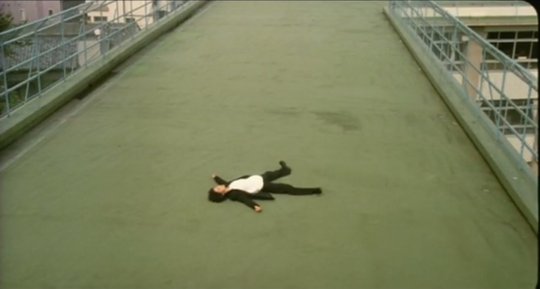
2 notes
·
View notes
Text
Hey Andrew, this was a delight to read lol. I could really feel your appreciation for the film and for food in general. I'm impressed with the level of detail with which you were able to describe the business lunch scene. It's truly a brilliant scene that very poignantly criticizes business culture which, as you put it, is governed by appearance. Also those sandwiches look amazing I want them in my mouth holy fuckkkk
Tampopo (1985)
You have a particular memory that is deeply attached to a specific food. We all do. For better or worse it brings us back there. Our relationship with food is numerous. Food is: culture, class, indulgence, erotic, danger, comfort, memory. Juzo Itami's Tampopo is a film about food. Not particularly a reflection on food but rather the ways in which individuals are reflected by the food they eat.
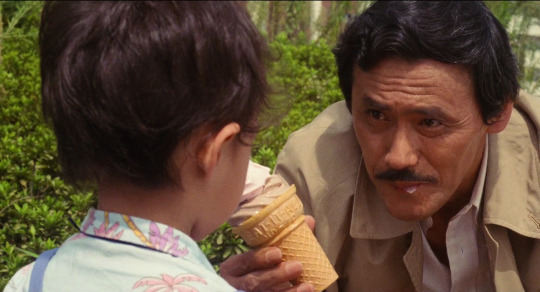
Tampopo predominantly tells the story of a down on her luck ramen shop owner of the same name struggling to maintain herself and her son after the passing of her husband. One day her unwanted suitor and his accompanying unwanted gang of lackeys are making themselves a nuisance whereupon our rugged but kind hero, Goro, rides in on his truck and then casts the goons out from her shop. This is the story that makes up most of Tampopo. It is not however the only story Tampopo tells. Throughout the film various small segments are interspersed throughout which expand on and explore Japan and it's food culture. This is among my favorite segments.
The Business Lunch
This segment follows a group of Japanese business men sitting down to a formal lunch together at an upscale French restaurant consisting of what appears to be a mixed group of high level executives, senior employees, and a junior employee at least half of their age which seems to be their whipping boy. As the waiter hands them their menus the executive and senior employees are taken aback, there is not a single word of Japanese on the entire page, not even a letter of katakana. Visible panic makes its way across their faces with one of them even falling victim to a twitch, only the junior employee seems to calmly but intently working his way through the menu. The oldest of the executives when first asked for his order claims he isn't very hungry and defers to another senior employee who orders the sole meuniere, consommé, and a Heineken (lightly grilled fish, broth, and beer). All the men after him place the same order, that is until the waiter arrives at the youngest employee. As he carefully reads the menu the most junior employee asks questions about every dish he intends to order and himself displays extensive and intimate knowledge of French cuisine and even the contemporary Parisian restaurant scene until finally deciding on the quenelles, escargot pastry, apple and walnut salad, all paired with Corton Charlemagne (a white wine). Each and every one of his superiors is left completely red in the face with embarrassment.
This scene puts on display and makes jest at so many of the common tropes of Japanese business. All business in this context is governed by appearance. European and by extension French cuisine serves as not something that these men necessarily want but feel inclined towards in order to maintain themselves as well informed and sophisticated. The silliest aspect of this is that the senior employee who sets down the order for the table and seems to have his order already memorized defaults on familiarity and orders a rough approximation of what one might presume he eats in his own time fairly frequently which is lightly grilled fish, a broth rich soup, and beer. The youngest employee at the table eschews the standard by placing on display his full skills as a gourmand as he orders, much to the chagrin of his senior who is so keenly aware of the embarrassment felt by himself and all the others at the table that he kicks his subordinate as he's ordering which in no ways deters him at all.
Food in this scene is remarked upon in the language of class and industrialism. French cuisine is not something that genuinely interests a majority of the business men present in this scene but rather functions as emblematic of a particular relationship between food and worldliness which they feel is a reflection of the makeup of their professional competence. I would like to try the quenelles.

I don't feel it's difficult to tell that this is one of my favorite films. I love Tampopo. There's so much I could say about nearly every part of this film and I didn't even discuss my favorite segment which was the Peking Duck Reverse Hustle. The only scenes which I skip over are the one in which the soft shell turtle is prepared and the pleasure of the shrimp. I love food. I love cooking. Throughout most of the break I've been struggling with a flu and have had little time to do much of what I hoped to. The day I decided to watch Tampopo with my roommate I was so set on cooking l I couldn't help myself. I decided on fried chicken sandwiches. I used a fairly simple recipe but made some general modifications according to my own tastes. In place of flour I used a mix of potato and corn starch because of how crispy my tonkatsu was with a similar mix and I added hot sauce to the dredge in order to add some kick. I didn't use enough oil so my chicken stuck quite a bit to the bottom and some pieces retained a few burnt marks and the oil darkened rather quickly. It was still quite good.
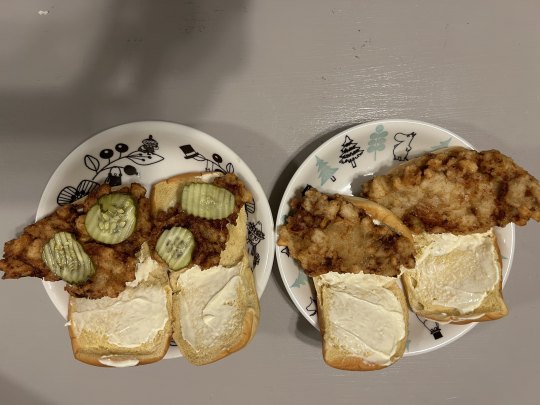
3 notes
·
View notes